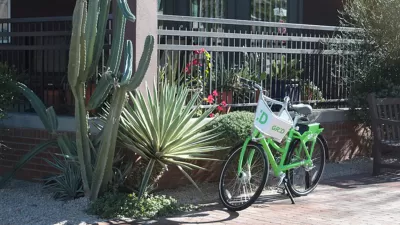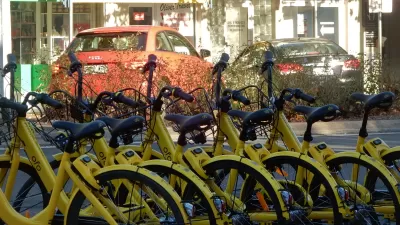Led by the companies Mobike and Ofo, so-called "dockless" bike sharing is all the rage in Chinese cities. Unlocked by app, the bikes can be left anywhere for the next user to pick up. There have been some hiccups.

Is "dockless" bikeshare a practical possibility? Maybe, judging from the success of operators Mobike and Ofo in China. Sherisse Pham writes, "The bikes can be locked and unlocked anywhere via a smartphone app, which means users don't have to return them to designated stations."
Now, this "game-changing" approach is getting its test run outside China. "One of China's largest operators, Mobike, unleashed 1,000 of its orange-wheeled bicycles in the rainy English city of Manchester on Thursday, marking its first foray outside of Asia."
As one might expect, operating a dockless bikeshare system comes with its share of challenges. "The rapid spread of this approach across China has already thrown up problems, including mountains of discarded bikes and companies going bust [...] To try counter those kinds of problems, Mobike and Ofo track their bikes through GPS and penalize users who hide bikes or park them in inaccessible places."
This data-intensive approach lets the companies finely tailor their logistics. "Prodding users to help redistribute their bikes is possible thanks to the data Mobike and Ofo collect on the millions of people who use their service daily -- they know when bikes are sitting idle, and when high traffic areas need more service."
FULL STORY: China's 'dockless' bike sharing could be coming to a street near you

Trump Administration Could Effectively End Housing Voucher Program
Federal officials are eyeing major cuts to the Section 8 program that helps millions of low-income households pay rent.

Planetizen Federal Action Tracker
A weekly monitor of how Trump’s orders and actions are impacting planners and planning in America.

Ken Jennings Launches Transit Web Series
The Jeopardy champ wants you to ride public transit.

California Invests Additional $5M in Electric School Buses
The state wants to electrify all of its school bus fleets by 2035.

Austin Launches $2M Homelessness Prevention Fund
A new grant program from the city’s Homeless Strategy Office will fund rental assistance and supportive services.

Alabama School Forestry Initiative Brings Trees to Schoolyards
Trees can improve physical and mental health for students and commnity members.
Urban Design for Planners 1: Software Tools
This six-course series explores essential urban design concepts using open source software and equips planners with the tools they need to participate fully in the urban design process.
Planning for Universal Design
Learn the tools for implementing Universal Design in planning regulations.
Ada County Highway District
Clanton & Associates, Inc.
Jessamine County Fiscal Court
Institute for Housing and Urban Development Studies (IHS)
City of Grandview
Harvard GSD Executive Education
Toledo-Lucas County Plan Commissions
Salt Lake City
NYU Wagner Graduate School of Public Service




























